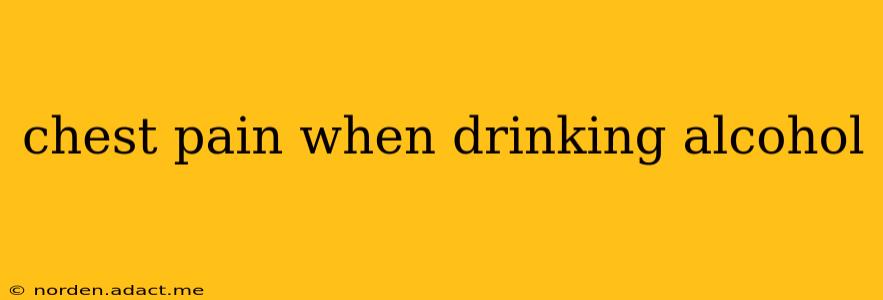Experiencing chest pain after drinking alcohol can be alarming. While sometimes it's a minor discomfort, it can also signal a serious underlying health issue. This comprehensive guide explores the various reasons why you might experience chest pain when drinking alcohol, helping you understand when it's a cause for concern and when it's likely something less serious.
What Causes Chest Pain After Drinking Alcohol?
The connection between alcohol consumption and chest pain isn't always straightforward. Several factors can contribute, ranging from relatively benign issues to life-threatening conditions. Let's explore some of the most common causes:
Acid Reflux (Gastroesophageal Reflux Disease or GERD):
Alcohol can relax the lower esophageal sphincter, the muscle that prevents stomach acid from flowing back into the esophagus. This relaxation allows stomach acid to reflux, causing a burning sensation in the chest, often mistaken for heart-related pain. This is a particularly common cause of chest pain after drinking, especially if you already suffer from GERD.
Heartburn:
Similar to acid reflux, heartburn is a symptom of acid reflux and can manifest as chest pain, often worsened by alcohol consumption. The burning sensation typically occurs behind the breastbone and can radiate to the neck or jaw.
Anxiety and Panic Attacks:
Alcohol can exacerbate anxiety and trigger panic attacks. The symptoms of a panic attack, including rapid heartbeat, shortness of breath, and chest tightness, can mimic the symptoms of a heart attack, causing significant distress and concern.
Heart Conditions:
While less common, alcohol can trigger or worsen underlying heart conditions. Pre-existing heart disease, coronary artery disease, or irregular heartbeats can be aggravated by alcohol consumption, leading to chest pain. This is a serious concern and requires immediate medical attention.
Esophageal Spasm:
Alcohol can cause the muscles in the esophagus to spasm, leading to intense chest pain that feels like a squeezing or crushing sensation. These spasms can be very painful but usually resolve on their own.
Pericarditis:
This is an inflammation of the pericardium, the sac surrounding the heart. While less frequently linked directly to alcohol, in some cases, it can be a contributing factor and result in chest pain.
Is Chest Pain After Drinking Always Serious?
Not all chest pain after drinking alcohol is a medical emergency. Many cases are related to digestive issues like acid reflux or heartburn. However, it's crucial to distinguish between mild discomfort and symptoms that indicate a serious problem.
When Should I Seek Immediate Medical Attention?
Seek immediate medical attention if your chest pain is accompanied by any of the following:
- Sudden, severe chest pain: Especially if it feels like tightness, pressure, or squeezing.
- Pain radiating to the jaw, neck, arm, or back: This is a classic symptom of a heart attack.
- Shortness of breath: Difficulty breathing is a serious symptom that requires immediate medical evaluation.
- Sweating, nausea, or dizziness: These are often associated with heart attacks or other serious conditions.
- Lightheadedness or fainting: These indicate a potential circulatory problem.
How Can I Prevent Chest Pain After Drinking?
While you can't always prevent chest pain entirely, these strategies can significantly reduce your risk:
- Moderate alcohol consumption: Limit your intake and avoid binge drinking.
- Eat before drinking: Food in your stomach can help buffer the effects of alcohol on your digestive system.
- Avoid trigger foods: Identify and avoid foods that worsen acid reflux or heartburn.
- Maintain a healthy lifestyle: Regular exercise and a balanced diet can improve overall health and reduce your risk of heart problems.
- Manage stress: Stress can exacerbate anxiety and trigger chest pain.
What Questions Should I Ask My Doctor?
This section directly addresses the "People Also Ask" questions often found on search engines related to chest pain after drinking alcohol.
Can alcohol cause a heart attack?
While alcohol itself doesn't directly cause heart attacks, excessive alcohol consumption is a significant risk factor for various heart problems, including coronary artery disease, which can lead to a heart attack. It's crucial to maintain moderate alcohol intake to minimize these risks.
Can alcohol cause chest tightness?
Yes, alcohol can cause chest tightness due to several factors, including acid reflux, esophageal spasms, anxiety, and panic attacks. Less commonly, underlying heart conditions aggravated by alcohol can also cause chest tightness.
What are the symptoms of a heart attack?
Symptoms of a heart attack can vary, but common signs include sudden, severe chest pain (often described as pressure, tightness, squeezing, or pain), shortness of breath, sweating, nausea, dizziness, and pain radiating to the arm, neck, or jaw. If you experience any of these symptoms, seek immediate medical attention.
Why does my chest hurt after drinking wine?
Wine, like other alcoholic beverages, can relax the lower esophageal sphincter, leading to acid reflux and heartburn, causing chest pain. The sulfites in wine can also exacerbate this in some individuals.
Remember, this information is for general knowledge and doesn't replace professional medical advice. Always consult a healthcare professional if you experience persistent or concerning chest pain, especially after drinking alcohol. Early diagnosis and treatment are crucial for managing and addressing underlying health issues.
